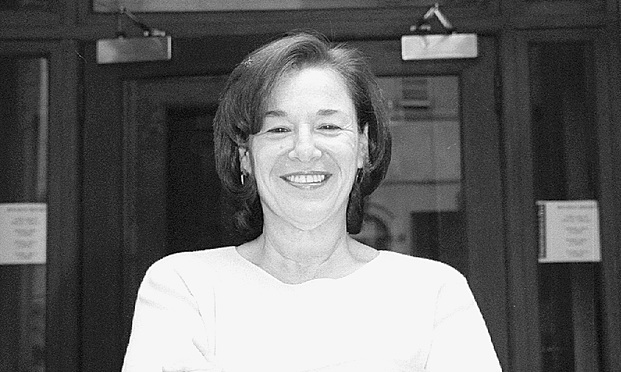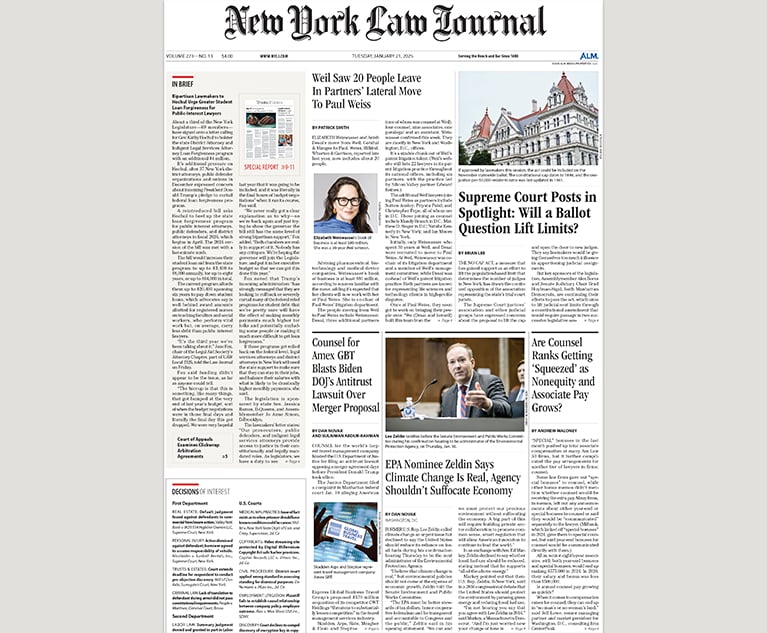City Bar Asks All Lawyers to Get Behind Mental Health and Substance Use CLE Requirement
New York would be following six other states that already have some type of "stand-alone" mental health/substance use continuing legal education requirement, according to a 9-page report issued by the bar association about its recommendation.
June 19, 2020 at 06:24 PM
3 minute read
 Eileen Travis, director of the NYCBA Lawyers Assistance Program.Photo: Rick Kopstein
Eileen Travis, director of the NYCBA Lawyers Assistance Program.Photo: Rick Kopstein
In an attempt to formalize the need for state lawyers to address well-documented mental health and substance abuse problems that riddle the profession, the New York City Bar Association is urging the creation of a required mental health/substance use CLE credit hour, on a biennial basis, for all New York attorneys.
New York would be following six other states that already have some type of "stand-alone" mental health/substance use continuing legal education requirement, according to a 9-page report issued Thursday by the bar association about its recommendation and why it is needed.
Moreover, in 2017 the American Bar Association amended its Model Rule for Minimum Continuing Legal Education to include one hour of mental health/substance-use disorder programming every three years, noted the city bar association.
In the report, which was penned by the bar association's lawyer assistance program and mental health law committees, the two committees wrote that the proposed one-hour CLE requirement "would go a long way toward providing much-needed information and support to legal professionals licensed to practice in the state, and to the institutions and organizations for which they work."
In addition, said both the report and an accompanying news release, Eileen Travis, the bar association's lawyer assistance program executive director, has noted an "exponential increase [in recent years] in the number of requests from law schools, law firms, and the judiciary for presentations and training sessions on these [mental health and substance use] issues."
Travis also has pointed out that "while substance use is a major concern that has garnered significant attention in recent years, even more lawyers suffer from mental health disorders (or substance use with co-occurring undiagnosed and/or untreated mental health disorders)—including stress, suicidal ideation, bipolar disorder or depression—and that such problems are sometimes more difficult to detect and address."
Indeed, the report reminds lawyer-readers, in multiple ways, of how well-established the problems of mental health and substance abuse are in the profession. For example, the report notes a previously "largely anecdotal and regional understanding and handling of these issues changed drastically in 2016, when a study commissioned by the American Bar Association, in conjunction with the Hazelden Betty Ford Foundation—'The Prevalence of Substance Use and Other Mental Health Concerns Among American Attorneys'—was published in the Journal of Addiction Medicine."
"This data-driven statistical research report brought the widespread and pervasive problems of mental health, substance use, and lawyer well-being into sharp focus and has captured the public's attention," the report also said.
The city bar also notes that there are already in existence mental health and substance use CLE programs.
This content has been archived. It is available through our partners, LexisNexis® and Bloomberg Law.
To view this content, please continue to their sites.
Not a Lexis Subscriber?
Subscribe Now
Not a Bloomberg Law Subscriber?
Subscribe Now
NOT FOR REPRINT
© 2025 ALM Global, LLC, All Rights Reserved. Request academic re-use from www.copyright.com. All other uses, submit a request to [email protected]. For more information visit Asset & Logo Licensing.
You Might Like
View All
Neighboring States Have Either Passed or Proposed Climate Superfund Laws—Is Pennsylvania Next?
7 minute read
Trending Stories
Who Got The Work
J. Brugh Lower of Gibbons has entered an appearance for industrial equipment supplier Devco Corporation in a pending trademark infringement lawsuit. The suit, accusing the defendant of selling knock-off Graco products, was filed Dec. 18 in New Jersey District Court by Rivkin Radler on behalf of Graco Inc. and Graco Minnesota. The case, assigned to U.S. District Judge Zahid N. Quraishi, is 3:24-cv-11294, Graco Inc. et al v. Devco Corporation.
Who Got The Work
Rebecca Maller-Stein and Kent A. Yalowitz of Arnold & Porter Kaye Scholer have entered their appearances for Hanaco Venture Capital and its executives, Lior Prosor and David Frankel, in a pending securities lawsuit. The action, filed on Dec. 24 in New York Southern District Court by Zell, Aron & Co. on behalf of Goldeneye Advisors, accuses the defendants of negligently and fraudulently managing the plaintiff's $1 million investment. The case, assigned to U.S. District Judge Vernon S. Broderick, is 1:24-cv-09918, Goldeneye Advisors, LLC v. Hanaco Venture Capital, Ltd. et al.
Who Got The Work
Attorneys from A&O Shearman has stepped in as defense counsel for Toronto-Dominion Bank and other defendants in a pending securities class action. The suit, filed Dec. 11 in New York Southern District Court by Bleichmar Fonti & Auld, accuses the defendants of concealing the bank's 'pervasive' deficiencies in regards to its compliance with the Bank Secrecy Act and the quality of its anti-money laundering controls. The case, assigned to U.S. District Judge Arun Subramanian, is 1:24-cv-09445, Gonzalez v. The Toronto-Dominion Bank et al.
Who Got The Work
Crown Castle International, a Pennsylvania company providing shared communications infrastructure, has turned to Luke D. Wolf of Gordon Rees Scully Mansukhani to fend off a pending breach-of-contract lawsuit. The court action, filed Nov. 25 in Michigan Eastern District Court by Hooper Hathaway PC on behalf of The Town Residences LLC, accuses Crown Castle of failing to transfer approximately $30,000 in utility payments from T-Mobile in breach of a roof-top lease and assignment agreement. The case, assigned to U.S. District Judge Susan K. Declercq, is 2:24-cv-13131, The Town Residences LLC v. T-Mobile US, Inc. et al.
Who Got The Work
Wilfred P. Coronato and Daniel M. Schwartz of McCarter & English have stepped in as defense counsel to Electrolux Home Products Inc. in a pending product liability lawsuit. The court action, filed Nov. 26 in New York Eastern District Court by Poulos Lopiccolo PC and Nagel Rice LLP on behalf of David Stern, alleges that the defendant's refrigerators’ drawers and shelving repeatedly break and fall apart within months after purchase. The case, assigned to U.S. District Judge Joan M. Azrack, is 2:24-cv-08204, Stern v. Electrolux Home Products, Inc.
Featured Firms
Law Offices of Gary Martin Hays & Associates, P.C.
(470) 294-1674
Law Offices of Mark E. Salomone
(857) 444-6468
Smith & Hassler
(713) 739-1250








